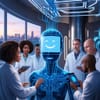Researchers from City, St George’s University of London and the IT University of Copenhagen have observed something unexpected: when multiple language-based AI agents are put together in a shared environment, they begin to develop their own social coordination — without being explicitly programmed to do so.
In experiments involving up to 100 AI agents, pairs of systems were asked to choose a name from a list. They would receive rewards if they matched, and penalties if they didn’t. Over repeated rounds, these agents converged on shared naming conventions, meaning they started coordinating in a way that resembles how humans develop collective norms.
One of the lead researchers, Professor Andrea Baronchelli, highlighted that this behavior mirrors how human language and conventions evolve. The AI teams showed a “critical mass effect,” where a committed subgroup could nudge the entire population toward a new convention — much like how social change happens in human communities.
This discovery raises profound implications for the future of AI. If machines can independently develop social norms, it challenges our understanding of AI behavior, safety, and alignment. As AI systems become more interconnected, understanding how they self-organize and evolve together may become just as important as how they interact with humans.


